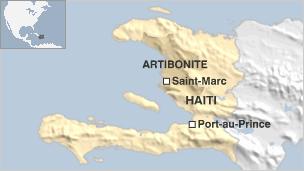Haiti's cholera death toll mounts
- Published
Julie Schindall from Oxfam explains the situation in Haiti
A cholera outbreak in Haiti has killed more than 200 people, officials say.
More than 2,500 people in a region to the north of the capital Port-au-Prince are being treated for the illness, which causes diarrhoea, acute fever, vomiting and severe dehydration.
There are fears the outbreak could reach camps housing the survivors of January's quake in Port-au-Prince.
Medics also say the neighbouring Dominican Republic should be alert to the risk of cholera.
Officials believe the cholera outbreak was caused by people drinking infected water from the Artibonite river.
'Source'
"We have recorded more than 208 dead," said Dr Gabriel Thimote, the director general of Haiti's health department.
He said most of the cases were in the Artibonite region of central Haiti. The Central Plateau region has also been affected.
The worst-hit areas were Douin, Marchand Dessalines and areas around Saint-Marc, about 100km (60 miles) north of Port-au-Prince, Dr Thimote said on Friday.
Local hospitals were "overwhelmed", and a number of people were being evacuated to clinics in other areas, he added.
Some patients at the hospital said they became ill after drinking water from a public canal, but others said they had been drinking purified water.
Local doctor Jhonny Fequiere told the BBC that he had seen 28 patients die and that his hospital in Marchand Dessalines was struggling to cope.
"We are trying to take care of people, but we are running out of medicine and need additional medical care. We are giving everything we have but we need more to keep taking care of people," he said.
The victims range in age, but the young and the elderly appear to be the worst-affected.
Spreading?
Aid agencies have been rushing medics and supplies of rehydration salts to the affected areas in a bid to stop the outbreak spreading to the Port-au-Prince area.

"The priority is really for us and our main concern is to isolate patients that have already been affected by the disease and to inform the population on how to prevent against being contaminated," said Rosa Crestani, an emergency co-ordinator with the aid agency Medecins sans Frontieres.
Later on Friday, the first two cholera cases outside the Artibonite were confirmed in Arcahaie, a town closer to Port-au-Prince, the Associated Press news agency reports.
It says that experts were also investigating possible cases in Croix-des-Bouquet, a suburb of the capital.
Tens of thousands of survivors of the devastating earthquake are still living in crowded tent cities in and around Port-au-Prince with poor sanitation and little access to clean drinking water.
This is the first time in a century that cholera has struck the Caribbean nation, the World Health Organization said.
The Artibonite department was not badly damaged in the earthquake but thousands of people who lost their homes have moved into camps or are living with relatives there.
- Published23 October 2010
- Published25 October 2010